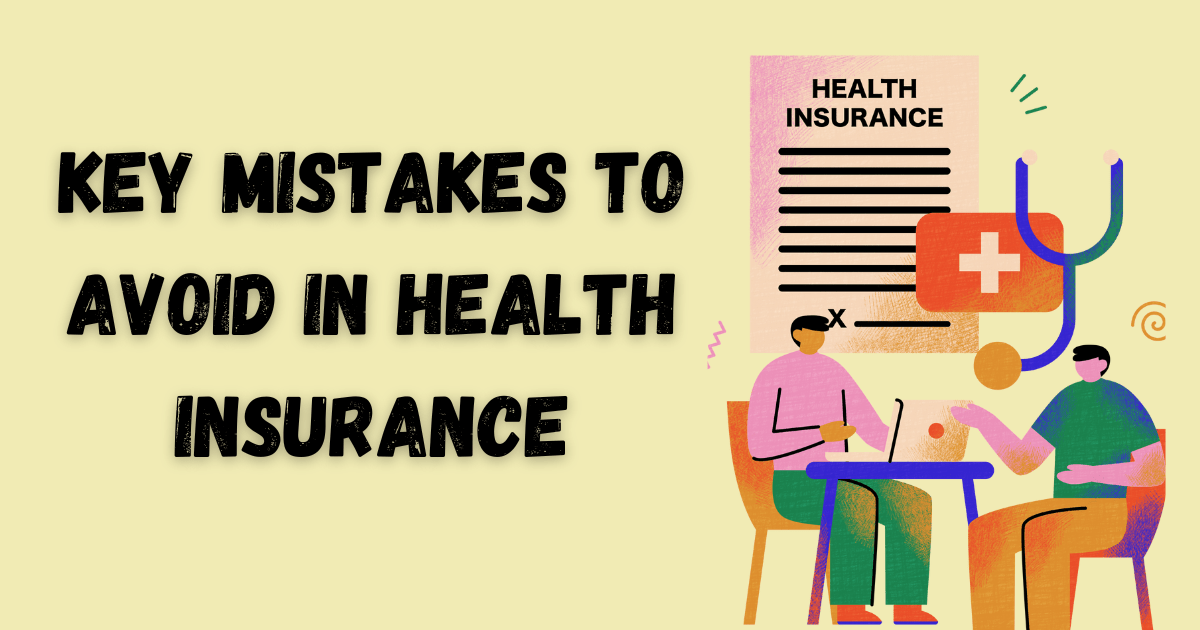Introduction
Health insurance is an important financial tool that provides security during medical emergencies. However, many people make common mistakes while choosing a policy, which can lead to financial burdens and claim rejections when they need coverage the most.
Understanding these mistakes can help individuals make better decisions and select a health insurance plan that truly meets their needs. This article explains the most frequent mistakes people make and how to avoid them when purchasing a health insurance policy.
1. Insufficient Coverage Amount
One of the biggest mistakes people make is selecting a low coverage amount. Medical costs in India are rising, and hospital bills for serious illnesses can be very high. A health insurance policy with a low sum insured may not be enough to cover all medical expenses.
Example: If a person buys a ₹3 lakh health insurance policy, but the treatment costs ₹5 lakh, they will have to pay the remaining ₹2 lakh from their pocket.
How to Avoid This Mistake?
- Choose a policy with a higher sum insured based on your needs, family size, and medical expenses in your area.
- Consider inflation and increasing healthcare costs while selecting the coverage amount.
- If affordability is an issue, look for top-up or super top-up plans to enhance coverage.
2. Neglecting Pre-Existing Conditions
Many people ignore pre-existing diseases while buying health insurance. Pre-existing conditions like diabetes, hypertension, and heart disease are usually covered after a waiting period. If a person does not disclose their health conditions, the insurer can reject claims later.
Example: A person with diabetes buys a policy but does not inform the insurer. Later, when they need hospitalization for diabetes-related complications, their claim may get rejected.
How to Avoid This Mistake?
- Always disclose pre-existing conditions honestly while buying a policy.
- Check the waiting period for pre-existing conditions and choose a policy with a shorter waiting period if possible.
- Some insurers offer special plans that cover pre-existing conditions sooner with an additional premium.
3. Not Understanding Policy Terms and Conditions
Many policyholders do not read the terms and conditions carefully. Every health insurance policy has exclusions, sub-limits, co-payments, and waiting periods that affect claim approvals.
Example: A policy may cover room rent only up to 1% of the sum insured. If a person chooses a higher room category, they may have to pay extra.
How to Avoid This Mistake?
- Read the policy document carefully before purchasing.
- Clarify doubts about sub-limits, co-payment clauses, and exclusions.
- If needed, consult a financial advisor or insurance expert before making a decision.
4. Not Comparing Policy Features
Many buyers purchase the first policy suggested by an agent or an online platform without comparing different plans. Not all policies offer the same benefits, and some may have hidden charges.
Example: One insurer may offer free health check-ups and maternity coverage, while another may not. Without comparing, a person may miss out on better features.
How to Avoid This Mistake?
- Use online tools to compare various health insurance plans.
- Compare coverage, benefits, claim settlement ratio, waiting periods, and additional features.
- Choose a policy that provides maximum benefits at a reasonable premium.
5. Focusing Solely on Premium Cost
Choosing a health insurance policy only based on the lowest premium can be a big mistake. A cheaper policy may have high deductibles, co-payments, or limited coverage.
Example: A low-cost policy may cover only basic hospitalization but exclude advanced treatments like robotic surgeries or organ transplants.
How to Avoid This Mistake?
- Consider the overall benefits and not just the premium cost.
- Check for exclusions, co-payment clauses, and sub-limits before purchasing.
- Opt for a policy that balances affordability and comprehensive coverage.
6. Not Assessing Network Hospitals
Health insurance companies have tie-ups with hospitals for cashless treatment. If a person’s preferred hospital is not in the insurer’s network, they may have to pay bills first and claim reimbursement later.
Example: A person living in Mumbai buys a health insurance policy without checking network hospitals. During an emergency, they realize their preferred hospital is not in the insurer’s list, leading to financial stress.
How to Avoid This Mistake?
- Check the list of network hospitals before buying a policy.
- Ensure that well-known hospitals in your area are included in the network
7. Ignoring Waiting Periods
Every health insurance policy has a waiting period for pre-existing diseases and specific treatments. Many people do not check this and later face claim rejections.
Example: A person needs knee replacement surgery but finds out their policy has a 2-year waiting period for joint replacement. They cannot claim insurance benefits immediately.
How to Avoid This Mistake?
- Check the waiting periods before buying a policy.
- If needed, look for plans with shorter waiting periods for essential treatments.
Conclusion
Buying health insurance is an important financial decision, and making the right choice can save money during medical emergencies. Avoiding mistakes like choosing insufficient coverage, ignoring pre-existing conditions, and not reading policy terms can help in selecting the best plan. Always compare different policies, check network hospitals, and understand waiting periods before making a final decision. By following these steps, you can ensure that your health insurance truly protects you and your family when needed.

